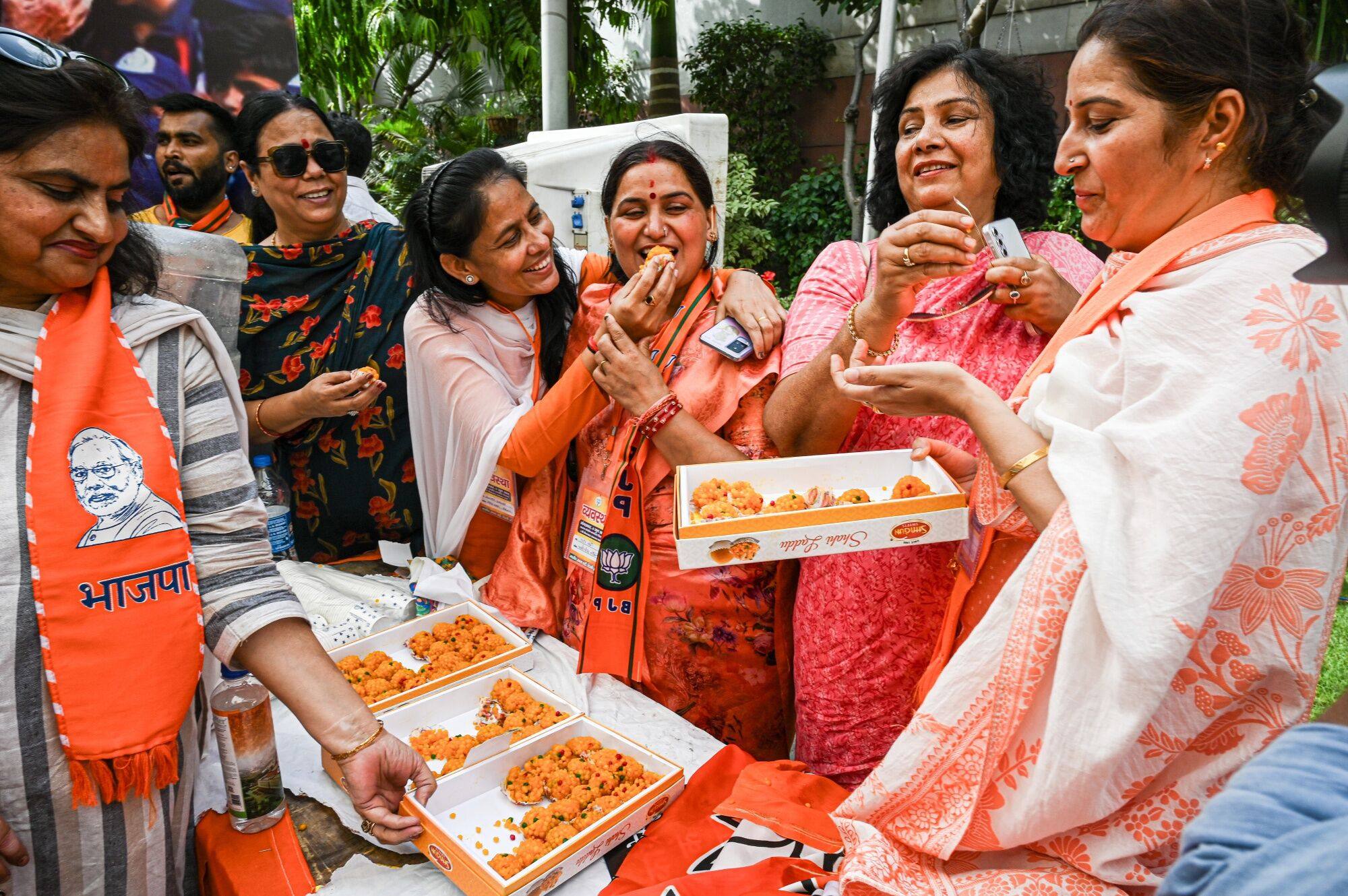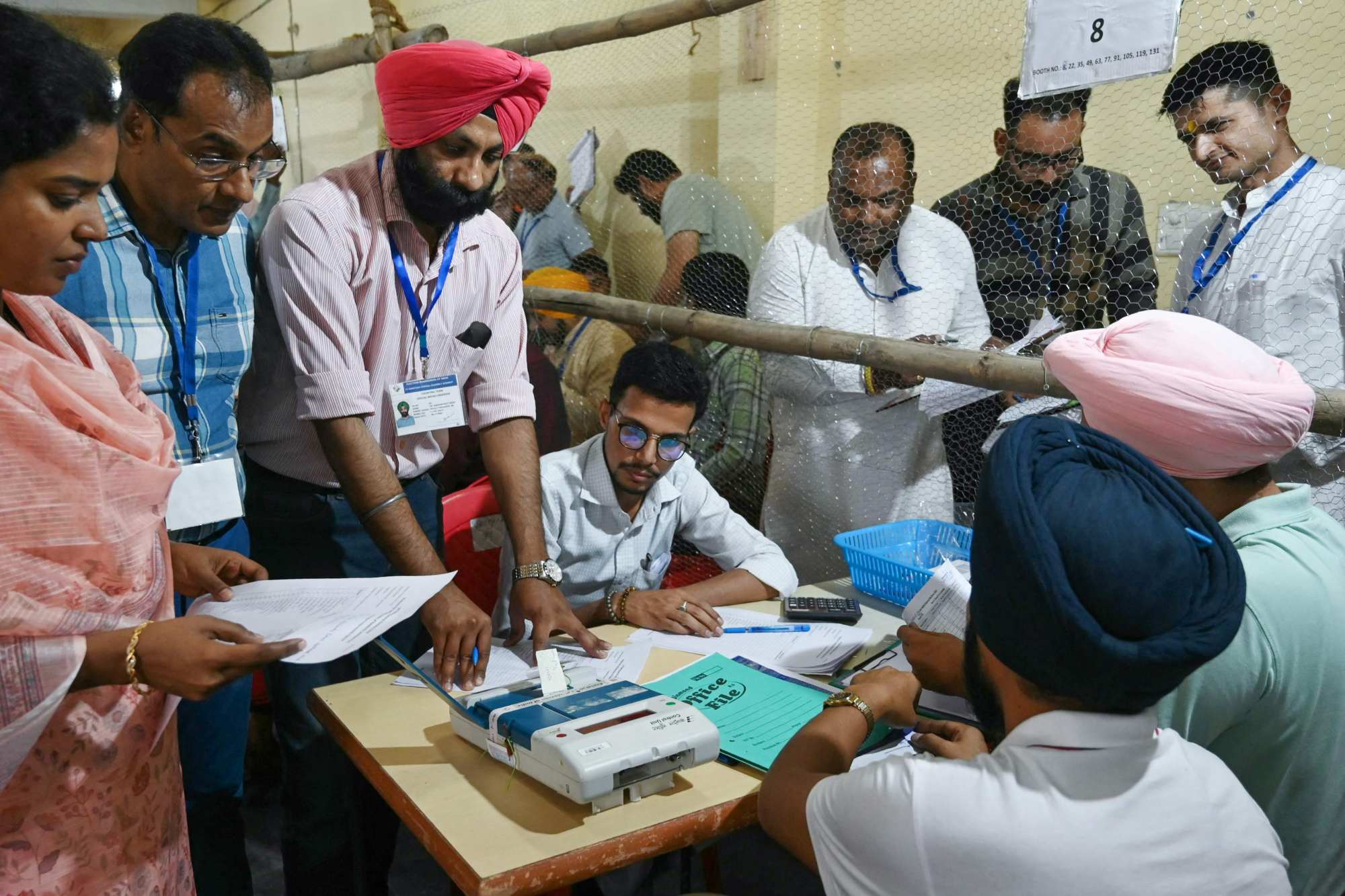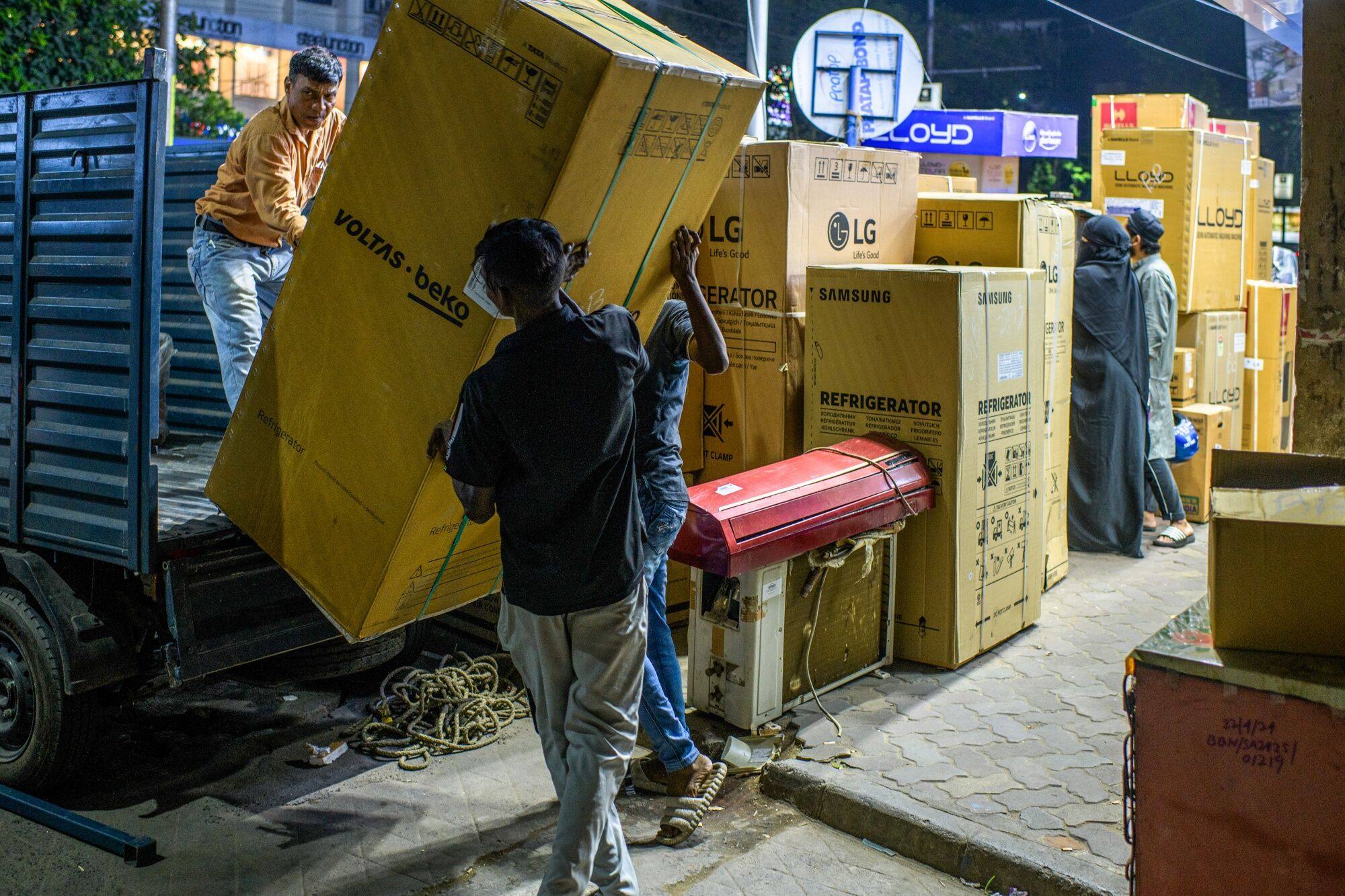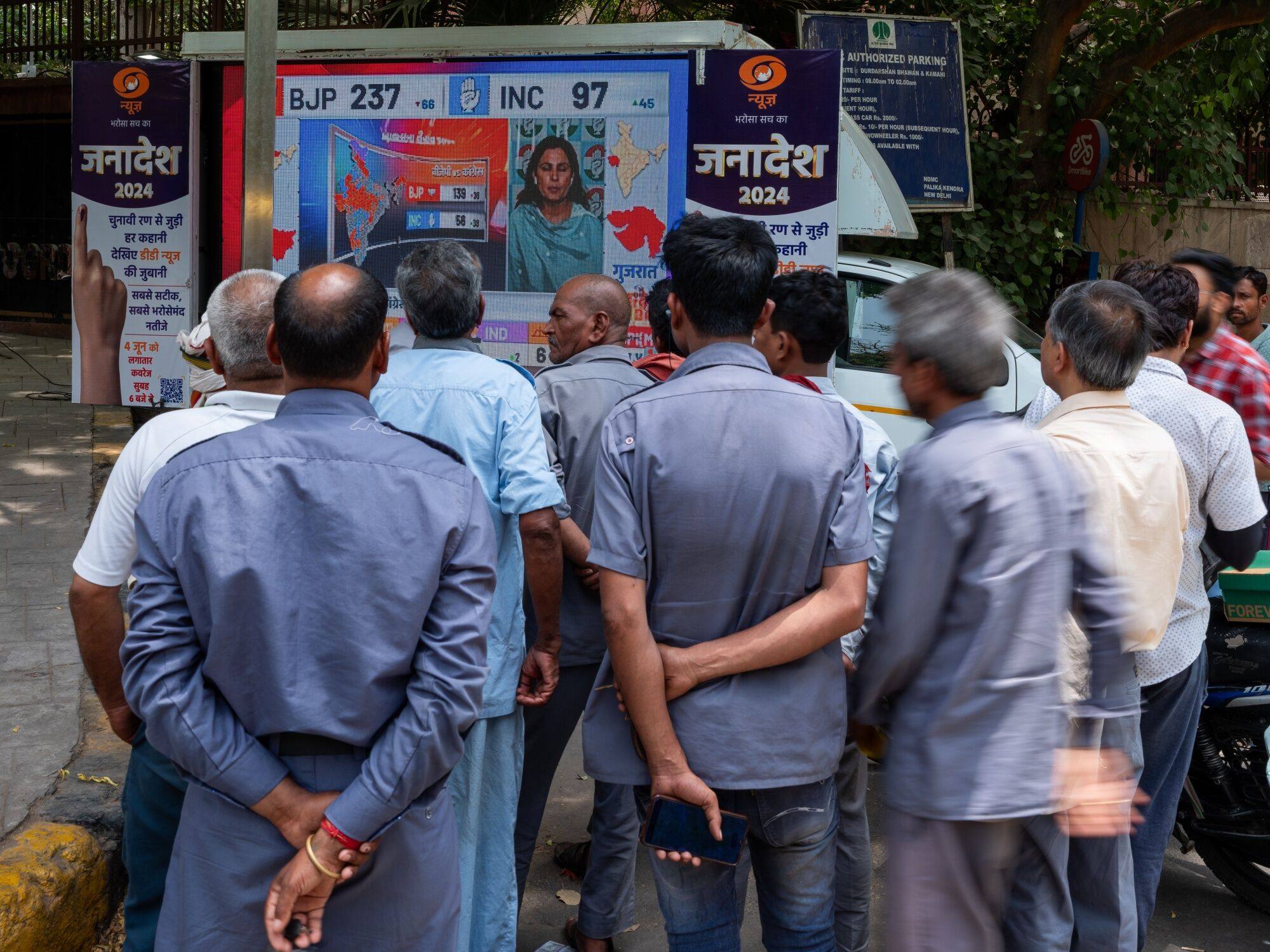“It looks like democracy has won and majoritarianism has come down. The voters are very intelligent. This is good for India,” said Harsh Ramaswamy, an independent political commentator.
“What they [the BJP] did not consider is they were only looking at emotional and religious issues. But voters were more bothered about the cost of living and issues that affected their everyday lives. It was the opposition Congress party which addressed those issues.”

Despite the setback, analysts say the BJP will still be able to muster the numbers needed to cross the majority mark with the help of allied regional parties under a National Democratic Alliance (NDA), which is ahead in 281 seats so far. Congress and its allies are leading in 224 seats.
Political analysts say it is possible that Congress and its allies may bid to form the government by wooing other parties or factions to support them.
Modi is widely expected to win a third term in office, which means he could equal the three-term record of Jawaharlal Nehru, India’s first prime minister who led the country from independence in 1947 to 1964.
Most exit polls had predicted a landslide win for the BJP, giving it a two-thirds majority.
But voters’ grouses about unemployment and rising living costs mean Modi could have his task cut out because he would no longer be able to call all the shots without a clear majority for the BJP.
“It is quite a surprise and it’s good for democracy. Politics is going to be more competitive and the government will be forced to be more consensual,” said Nilanjan Mukhopadhyay, an independent political commentator.
“Modi will now have to work with a coalition and display skills that he has not displayed so far. It will be a big challenge for Modi.”
The final results of the world’s largest democratic exercise, which began on April 19 and concluded on Saturday, are due later on Tuesday.

It may be the last term in office for 73-year-old Modi, who has overseen India’s rapid economic growth in the last decade. The Indian government has lowered tariffs and introduced policies to steer the economy to shift towards manufacturing growth from the services sector.
But analysts say the new government will need to broaden and deepen India’s growth to provide jobs to its teeming millions.
“The room for IT services growth is limited. What we need is jobs for everyone. India needs rapid liberalisation. It has a lot of working-age people. We need to absorb them,” said Alicia Garcia Herrero, chief economist for Asia-Pacific at Natixis, in a webinar on Tuesday.
The country would need to add 115 million jobs by 2030 in labour-intensive manufacturing industries to provide employment, she noted.
Analysts say the election results have underscored the importance of economic benefits reaching India’s hinterlands, rather than being skewed towards the elite and urban rich.
“Voters have shown that a pitch of better job opportunities and inclusive growth mattered more than the Ram Mandir and nationalism,” said Pratik Dattani, founder of London-based think tank Bridge India, referring to the temple complex for the Hindu god Ram on the site of a razed mosque in Uttar Pradesh.
“Modi’s poll pitch was light on policies, whereas the opposition focused on the discontent over rising unemployment across the country.”

Analysts note the BJP’s focus on divisive issues to woo the majority Hindus appears to be mattering less to voters.
Sandeep Shastri, director of academics at the Nitte Education Trust and national coordinator of the Lokniti network, which studies elections, said the BJP’s setbacks stemmed largely from its poor performance in Uttar Pradesh, Maharashtra and Rajasthan.
The opposition India alliance put up a formidable front led by the regional Samajwadi party and Congress, while the BJP suffered because it did not opt to change candidates, he said.
In the western state of Maharashtra, a faction of the regional Shiv Sena party was able to strike a chord with voters.
And in Rajasthan, Congress gained ground as veteran leader Ashok Gehlot and deputy Sachin Pilot put up a united front after suffering a loss in state polls in November, he added.
“We will have a [BJP-led] NDA government, but one where the BJP may not have a majority on its own. It will weaken the BJP’s leverage over the coalition,” he added.
The BJP made up for losses in its northern stronghold areas with gains in southern states such as Andhra Pradesh, Telangana and Kerala.

‘Tectonic shift’
Traditionally, the BJP’s pitches to woo the Hindu majority have mattered less in the southern states and more in the northern states.
According to Kingshuk Nag, an author and an independent political commentator, the gains come from years of preparatory work by the right-wing Hindu group, Rashtriya Swayamsevak Sangh (RSS), which has a vast cadre network and is the ideological mentor to several BJP leaders, including Modi.
“The voting trend indicates a tectonic shift is taking place in Indian politics. I think it will take at least 48 hours to play out to understand the direction in which the government will be going,” he said.
The results could herald the BJP gradually shifting more of its stronghold to southern India in coming months.
Modi, who hails from the western state of Gujarat, contested from the ancient Indian town of Varanasi in Uttar Pradesh “because he thought he could consolidate power far better in north India”, Nag said.
“But issues such as construction of the Ram temple in Ayodhya are coming unstuck.”.
Nag said he expected the forthcoming coalition government to be stable, but unlikely to be as strong as the previous two BJP administrations.
“There will certainly be a lot of pressure on Modi. I am not sure whether he will be the prime minister or not,” he said, adding that a renewed mandate for Modi could depend on the internal workings of the party and the RSS.

